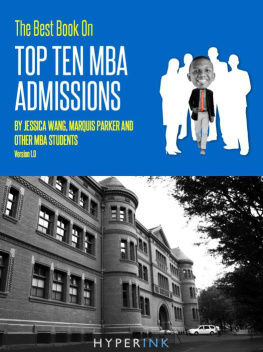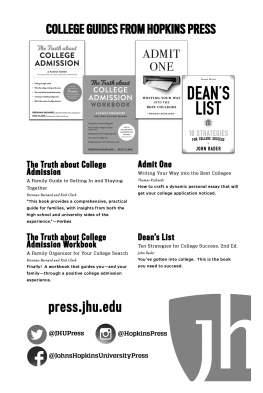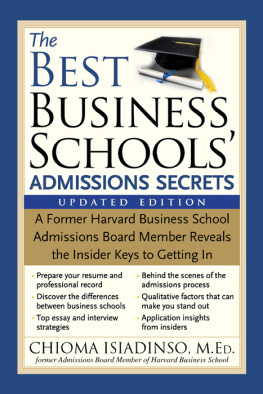The Best Book on Top Ten MBA Admissions
Top Ten MBA
I.
Top Ten MBA I thought I had done well, but now I can look back and say I bombed it. I had no clue of how to actually interview and what an MBA interview is looking for.
Rules & Advice For MBA Applicants
One question that students thinking about applying to business school must absolutely ask themselves is, What would a business degree do for me? Students who cannot answer this question should think about pursuing further work experience before committing to spending two years and hundreds of thousands of dollars on an MBA. Consult with people in your desired industry, talk to your advisers, and determine whether you really need a business degree in order to get where you want to be.
If you want to transition from a technical industry into business, then yes, getting an MBA is definitely a way to do that.
< class="calibre1">
I had been working for four years. I knew if I stayed another year or two, I would be locked into being a tech lead. That was all I could see myself being when I looked four to six years into the future.
I didnt feel that I had the confidence to chase my goals, so I drew a line in the sand. I told myself that I had to start looking at business schools, and I had to apply. I dont even know if I was really ready when I applied. I just knew it was something I needed to do to move forward.
I didnt really know what I was getting myself into. I guess I really didnt know enough about the full scope of what I would get from an Ivy League business school. I did know it would teach me about business and allow me to reboot my career. Marquis Parker
</>
While some students coming out of an MBA program do move toward entrepreneurship, most use the recruiting and networking opportunities that present themselves to get a high paying job in consulting or finance. Graduates interested in starting their own companies will often use money earned working as corporate analysts to fund the costs of their own start-ups until that initial angel round. Most MBA graduates, though, want to begin moving up the corporate ladder, toward positions as partners or CEOs, and the top salaries that come with those roles.
< class="calibre1">
One of the main reasons people choose to go to business school is to find a job at a bank or a consulting firm or a big company. There are lots of opportunities to find this kind of position when attending a top 10 business school. If you are looking for something outside of these categories, you can always look on your own, You might choose to work for start-up or if there is a specific company you want to work for, you can pursue that independently. Of course, you could always start your own company, but that would be unusual for an MBA student. Jessica Wang
</>
Some business students enter business school expecting the next two years to be a vacation before their big start at McKinsey or some other large firm. While many students, especially those whose tuition is being paid by employers, can potentially coast through their classes, there are many opportunities for personal growth. Business schools seek to instill the next generation of corporate leaders with a sense of ethics and corporate responsibility, and this can lead to a high level of intellectual debate within classes.
< class="calibre1">
The last big surprise for me was that business school is much more touchy-feely than you would expect. Its less about the theory and the frameworks, though theres a bit of that, and more about debating high-level gray areas, like, Should publicly traded companies disclose earnings every quarter? What seems like a mechanical topic can turn into something more emotional. And in a leadership class that asks students what they want out of life, the assignments truly prompted meaningful reflection. James Hu
</>
MBAs can be very useful for students who wish to rise rapidly within existing corporate structures. While many top executives do not have business degrees, for the most part, these leaders came to prominence by starting their own companies or working in a new venture from the ground up, and then possibly moving to a different CEO position once they have gained some renown. A business degree is most useful if youre looking to work your way up to partner or vice-president in an existing corporation, rather than starting off as CEO of your own small company.
< class="calibre1">
After I had worked at Bain for a while, I took a job at The Wall Street Journal. I started out working in strategy and operations. I liked this position because it allowed me to use my consulting skills. At The Wall Street Journal, I was able to work on some high level projects and implement some actions at an operational level. I was able to see the impact of my work. This was quite different from my experience at Bain. After spending a year at The Wall Street Journal, I decided I wanted to work toward my MBA. Jessica Wang
</>
In this section, Top Ten MBA Admissions, youll learn the answers to questions you would never have considered asking about your potential MBA program, as well as some final advice for MBA candidates about their applications.
Why I Went For an MBA
It is standard for students to have a couple years of work experience under their belts before applying to an elite business school. For me, it took about four years to apply, and I had five years of work experience by the time I started my MBA program. This was partly because, though I may not have actually felt ready, I did feel trapped. More than to build a new life, I wanted to get away from the life I already had. At that point, I knew I had to apply to business school, or I wouldnt have been able to build my career.
I had to move forward!
My first degree was in IT management. I thought that would get me the business expertise I needed, but it hadnt. I had been working for four years. I knew if I stayed another year or two, I would be locked into being a tech lead. That was all I could see myself being when I looked four to six years into the future.
I didnt feel that I had the confidence to chase my goals, so I drew a line in the sand. I told myself that I had to start looking at business schools, and I had to apply. I dont even know if I was really ready when I applied. I just knew it was something I needed to do to move forward.
I didnt really know what I was getting myself into. I guess I really didnt know enough about the full scope of what I would get from an Ivy League business school. I did know it would teach me about business and allow me to reboot my career.
In retrospect, I guess I wasnt really ready for business school until I got there, as opposed to some people who begin the application process already having a practical justification for their decision. Because of this, I found myself scrambling and making things up as I went along.
My advice is to look ahead to your post-business school career, envisioning a concrete goal and mustering the confidence to attain that goal. It all worked out for me in the end, but it might have gone even more smoothly if I had plotted my goals more definitely in the first place.
Misconceptions About Business School
One aspect of business school that surprised me was how friendly people were. Harvard Business School can project a stiff, overly serious aura, but in general I found the atmosphere more laid back than I had anticipated. Depending on your expectations, you might feel similarly.
I also found the workload heavier than I had expected. Far from a two-year vacation, business school involves








![Reding - Grads Guide to Graduate Admissions Essays] : Examples from Real Students Who Got into Top Schools](/uploads/posts/book/101661/thumbs/reding-grad-s-guide-to-graduate-admissions.jpg)